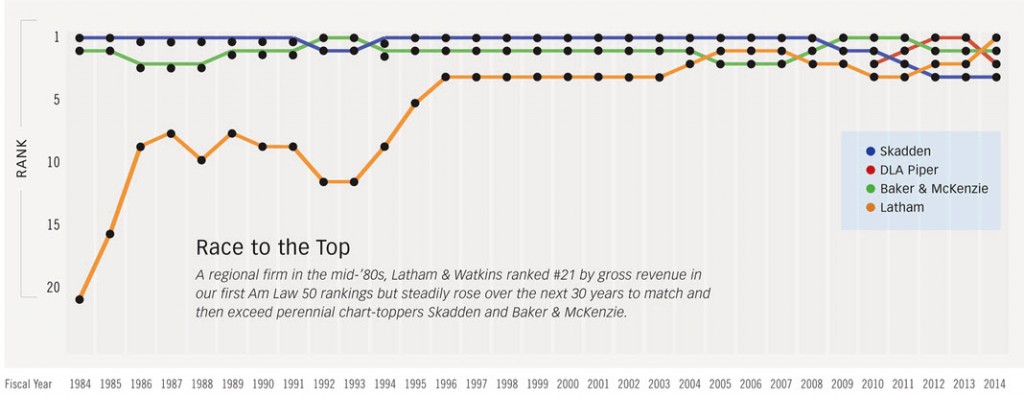A slightly briefer version of this column appeared in Bloomberg Law’s Business of Law. I republish it here with their kind permission, and with a small amount of additional elaboration.
Fact: For the first time, Latham & Watkins took the top spot for revenue in the American Lawyer rankings.
Hypothesis: Some industry commentators have said that to be successful, firms either have to have global reach (e.g., Baker & McKenzie, DLA Piper, etc.) or reputational expertise (Sullivan & Cromwell – Wall Street, or Wilson Sonsini – tech).
Discuss.
With all due respect to the unidentified “industry commentators,” I think Latham’s nothing-short-of-remarkable rise over the past two decades from classy King of the Hill in LA to something as close to global dominance as we’ve yet seen in Law Land has been largely attributable to their following a homemade strategic recipe, and not a conventional playbook like “global reach” or “expertise.”
Sure, today they most assuredly have global reach and clients will fall over themselves to tell you they have expertise, but imagine this SAT type exercise: Given a list of five law firms, the four firms named above together with Latham, pose the question, “Which firm on this list is unlike the other firms?” I hope 90+% of you following along at home would respond, “Latham.”
I believe what distinguishes them is focus and courage.
Ever since early on in Bob Dell’s storied tenure when he decided to go global (with the endorsement of McKinsey behind him), the firm has set ambitious goals and pursued them with discipline backed by consensus. (Consensus is not to be confused with unanimity, or even with silencing every critic.)
Going global was not the only goal: Doing so with an emphasis on certain particular high-value practices has also been an integral part, and that’s where “focus” comes in. Latham has never aspired to be a jack of all trades, master of none type of firm; rather, they have targeted high-profile practices such as M&A, private equity, energy, and complex financing in general.
Many firms, which shall remain nameless, think going global means one or both of two things:
- planting a flag pretty much everywhere that has a major international airport; and/or
- reproducing the full-service home office in far-flung jurisdictions and precincts.
Both of these are mistakes; both can be avoided by “focus.”
Planting flags promiscuously without regard to one’s raison d’etre for being there (“because we can”?) is the disease of empires, and we’ve seen how badly that ends for those involved, from Alexander the Great onward.
And cloning the home office’s wide array of practices and full service menu is equally, well, inexcusable. I’m delighted, as should you be, that your firm is King of the Hill in your own backyard, but business communities at the remove of several time zones and probably some not immaterial culture differences may not find your full menu of offerings compelling.
And the second trait, courage?
The firm has embraced risk at times and been decisive enough to make investments even at the cost of short-term sacrifice—which is kind of the definition of “investment,” isn’t it? Pity more law firm partners don’t seem to understand this. According to the very same May 2015 issue of The American Lawyer ranking Latham #1 for the first time, Dell spent a year touring Latham offices persuading his partners that global growth was the right path and secured their consent to spending the half decade and $100-million it would take to get there.
In a word, Latham has courage. That’s a vanishingly rare attribute among law firms.
Envious of them? Wish your firm could be “more like Latham?” That’s a pleasant enough sentiment (and an understandable one, I hasten to sympathize and to add) but without more you are being intellectually lazy.
To be “more like Latham” will require you and your partners to be prepared to be courageous. For oh, say, 20 years running.
It was true a few thousand years ago and remains so today: As you sow, so shall you reap.
No one said getting to #1 would be easy.




I am with you on focus and courage, Bruce. Especially given some earlier threads, what interests me is that Latham has had (empirically) a well-functioning partnership. You identify this in the early part of the post, where you speak about consensus. And they have had a steady hand at the tiller for a long while. Perhaps that is one part inspiration and ninety-nine parts perspiration, as Edison claimed for his own accomplishments, but it is notable that there is sometimes the conjunction of a great leader with a great team that accomplishes things that seem all but impossible for others. And yet, they obviously are possible. I am sure there is much to this fascinating story.